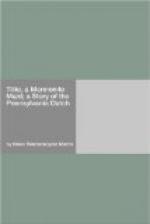XVIII
TILLIE REVEALS HERSELF
In the next few days, Tillie tried in vain to summon courage to appeal to the teacher for assistance in her winter’s study. Day after day she resolved to speak to him, and as often postponed it, unable to conquer her shyness. Meantime, however, under the stimulus of his constant presence, she applied herself in every spare moment to the school-books used by her two cousins, and in this unaided work she succeeded, as usual, in making headway.
Fairehilds’s attention was arrested by the frequent picture of the little Mennonite maiden conning school-books by lamp-light.
One evening he happened to be alone with her for a few minutes in the sitting-room. It was Hallowe’en, and he was waiting for Amanda to come down from her room, where she was arraying herself for conquest at a party in the village, to which he had been invited to escort her.
“Studying all alone?” he inquired sociably, coming to the table where Tillie sat. and looking down upon her.
“Yes,” said Tillie, raising her eyes for an instant.
“May I see!”
He bent to look at her book, pressing it open with his palm, and the movement brought his hand in contact with hers. Tillie felt for an instant as if she were going to swoon, so strangely delicious was the shock.
“‘Hiawatha,’” he said, all unconscious of the tempest in the little soul apparently so close to him, yet in reality so immeasurably far away. “Do you enjoy it?” he inquired curiously.
“Oh, yes”; then quickly she added, “I am parsing it.”
“Oh!” There was a faint disappointment in his tone.
“But,” she confessed, “I read it all through the first day I began to parse it, and—and I wish I was parsing something else, because I keep reading this instead of parsing it, and—”
“You enjoy the story and the poetry?” he questioned.
“But a body mustn’t read just for pleasure,” she said timidly; “but for instruction; and this ‘Hiawatha’ is a temptation to me.”
“What makes you think you ought not to read ’just for pleasure’?”
“That would be a vanity. And we Mennonites are loosed from the things of the world.”
“Do you never do anything just for the pleasure of it?”
“When pleasure and duty go hand in hand, then pleasure is not displeasing to God. But Christ, you know, did not go about seeking pleasure. And we try to follow him in all things.”
“But, child, has not God made the world beautiful for our pleasure? Has he not given us appetites and passions for our pleasure?—minds and hearts and bodies constructed for pleasure?”
“Has he made anything for pleasure apart from usefulness?” Tillie asked earnestly, suddenly forgetting her shyness.
“But when a thing gives pleasure it is serving the highest possible use,” he insisted. “It is blasphemous to close your nature to the pleasures God has created for you. Blasphemous!”




